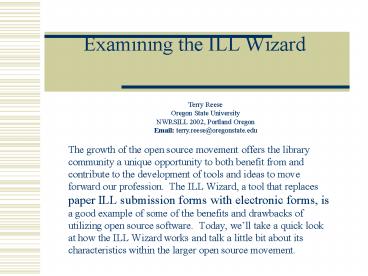Examining the ILL Wizard - PowerPoint PPT Presentation
1 / 9
Title:
Examining the ILL Wizard
Description:
The ILL Wizard, a tool that replaces paper ILL submission forms with electronic ... Available for download from: http://library.olivet.edu/iso-ill.html ... – PowerPoint PPT presentation
Number of Views:67
Avg rating:3.0/5.0
Title: Examining the ILL Wizard
1
Examining the ILL Wizard
Terry ReeseOregon State UniversityNWRSILL 2002,
Portland OregonEmail terry.reese_at_oregonstate.edu
- The growth of the open source movement offers the
library community a unique opportunity to both
benefit from and contribute to the development of
tools and ideas to move forward our profession.
The ILL Wizard, a tool that replaces paper ILL
submission forms with electronic forms, is a good
example of some of the benefits and drawbacks of
utilizing open source software. Today, well
take a quick look at how the ILL Wizard works and
talk a little bit about its characteristics
within the larger open source movement.
2
Where are we going?
In reality, a discussion about open source and
the open source community is a big topicbigger
than the time we have here today. As such, I
will be limiting my conversation to the ILL
Wizard and how it illustrates some of the
benefits and ills within the community.
- What is the ILL Wizard?
- Who developed it?
- Where can I get it?
- What do I need to make it run?
- How does it work?
- How can I make it work for me?
- How does it relate to open source?
- The Good
- The Bad
- Conclusion
3
What is the ILL Wizard?
- Its a web-client application developed by Byran
Wilhelm in 1999. - Available for download from http//library.olivet
.edu/iso-ill.html - The program is a Java applet (fig.1), meaning
that it runs from a users browser. - Its designed to allow users to request materials
directly through its ILL service provider. - Removes the need for paper submissions.
- Offers three different ILL request reporting
options - Send requests directly to an OCLC review file.
- Send requests directly to the first lender in a
string of five which are generated. automatically
based on priorities set by library staff. - Send requests directly to a pre-determined list
of ILL lenders.
4
How does it work?
- Uses International Interlibrary Loan standard,
ISO-10161 in making requests. - Designed to work with OCLCs Direct Request
service. - Replaces paper ILL request by offering request
forms for - Books (fig. 2)
- Articles (fig. 3)
5
Making it work for Me
(Ill focus on OCLC for the example)
- Working with OCLC (or your ILL vendor)
- To send output to the OCLC Review file, nothing
needs to be done. - To use the Direct to Profile or Direct to Vendor
options, you will need to access the OCLC Direct
request planning guide available at
http//www.oclc.org/oclc/man/9921dill/ - Do I need to modify the program source?
- No no modification of the source is necessary
for this program to work.
6
Making it work for Me
- So how do I modify this applet for my library?
- While no source code modification is necessary,
one can adapt the applet to his or her own
library through the applets parameters. - 34 customizable parameters.
- Parameters are set via the HTML
- Modifying Parameters Fig. 4
- Viewing the applet http//osulibrary.oregonstate.
edu/reeset/illwizard/illwizard.html - System Requirements
- Java Enabled web browser.
7
Relating to open source
In a lot of ways, the ILL Wizard is a good
representation of both the benefits and the
difficulties associated with open source. On the
one hand, the ILL Wizard is free software that
requires little to no development time to start
use. On the other hand, support and future
development of the project oftentimes remain up
to the individual user or larger user community.
8
Relating to open source Good
- Free software.
- Access to and ability to modify source code.
- Primary access to the developer.
- Grass roots user and support base.
9
Relating to open source Bad
- Application support falls primarily to the
individual user (or library). - Author may move on to other projects.
- Example ILL Wizard is not compatible with JRE
1.4 and must use Microsofts VM (which is no
longer available) to function. - Modification can be somewhat difficult.
- Example ILL Wizard and signature files.































